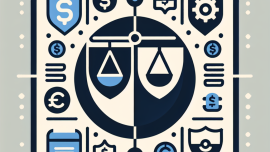
The Hidden Costs of Overdrafts: Why APR Doesn’t Tell the Whole Story
The Truth About Credit Reporting Agencies: What Consumers Need to Know
When you hear the phrase “credit reporting agencies,” do your eyes glaze over like you’re about to read the instruction manual for a toaster? Don’t worry — you’re not alone. But here’s the thing: these agencies hold more power over your financial future than almost any other institution you’re likely to interact with. And understanding how they work isn’t just “nice to know” — it’s essential to protecting your rights and your money.
Hi, I’m Eleanor “Ellie” Cartwright, and I’m not here to sugarcoat institutional shortcomings. I’m here to equip you — the everyday consumer — with the knowledge you need to stand up for your financial dignity. So grab your mental magnifying glass, because we’re about to investigate the shadowy world of credit reporting agencies.
What Are Credit Reporting Agencies (CRAs)?
Credit reporting agencies — sometimes called credit bureaus — are organizations that collect and manage information about your credit history. The big three in the United States are:
- Equifax
- Experian
- TransUnion
They gather data about your borrowing and repayment behavior — loans, credit cards, student debt, mortgages, etc. — and assign you a credit score, a three-digit number that can make or break your ability to secure a mortgage, rent an apartment, or even land a job. Yes, really.
Where Do They Get Their Information?
CRAs don’t just conjure your data out of thin air. They get it from:
- Lenders and creditors
- Collection agencies
- Utilities and service providers
- Public records, like bankruptcies or evictions
This data feeds into credit reports, which are then used to assess your “creditworthiness.” But the kicker? You never explicitly signed up for this. You don’t have a “CRA account.” They collect your information regardless of your consent in most cases. Yes, it’s as creepy as it sounds.
Why Should You Care?
If your credit report is wrong — and trust me, errors are more common than you think — it can affect:
- Your interest rates
- Your ability to get a loan
- Your rental applications
- Your employment prospects (in industries where credit checks are permitted)
In 2022, the Consumer Financial Protection Bureau (CFPB) reported that it received over 500,000 complaints about credit reporting agencies — with the vast majority concerning inaccurate information. Translation: these agencies are not infallible, and errors on your report can cost you dearly.
Your Rights Under the Fair Credit Reporting Act (FCRA)
The FCRA is a federal law that grants you specific rights regarding your credit information. Let’s break those down so you know the artillery at your disposal:
- You have the right to access your credit report for free once a year. Go to AnnualCreditReport.com — don’t fall for lookalike scam sites.
- You have the right to dispute incorrect information. CRAs must investigate disputes within 30 days.
- You must be notified if information in your credit report is used to deny you credit or employment.
- You can place a fraud alert or credit freeze on your reports. Ideal if you’ve been a victim of identity theft.
Wait — How Do I Dispute an Error?
Ah, the burning question! Here’s the battle plan:
- Request your credit report and identify any incorrect or suspicious entries.
- Submit a dispute with the relevant CRA directly — online or by mail.
- Include documentation to support your case. No, “trust me, bro” isn’t a sufficient citation.
- Wait for the agency to investigate. They must respond within 30 days. If they don’t? You can escalate to the CFPB.
Pro tip: When mailing disputes, go old school. Send via certified mail with a return receipt. That way, you can prove they received it and when.
Current Issues Facing Credit Reporting Agencies
Credit reporting agencies have long been accused of opacity and negligence. Let’s look at a few of their greatest hits:
- Equifax Data Breach (2017): Personal information of 147 million Americans was exposed. Did they pay dearly for that colossal blunder? Barely. Just $575 million settled — a drop in their annual revenue bucket.
- Lack of accountability: Many consumers report endless loops of investigations yielding no results.
- Disparities and discrimination: A 2021 CFPB study noted that underserved communities are more likely to have incomplete or inaccurate credit files, reinforcing systemic inequities.
So if you feel powerless as a consumer… you’re not imagining things. But you’re not powerless, either. The more information and tools in your arsenal, the stronger your stance.
How to Advocate for Yourself
Ready to channel your inner consumer warrior? Let’s get practical.
1. Stay Informed
Set a calendar reminder to check your credit report every four months. Rotate between the three CRAs — Equifax, Experian, TransUnion — to keep ongoing tabs.
2. Speak Up
If you find an error or have a complaint, file it with the Consumer Financial Protection Bureau. They can investigate and often trigger real change.
3. Freeze, Don’t Fret
If you’re not planning to apply for credit soon, freeze your reports. It’s free, easy, and keeps identity thieves out of your financial business.
4. Advocate for Stronger Policies
Write to your representative about strengthening CRA regulations. Push for:
- Stricter penalties for data mishandling
- Mandatory human-reviewed dispute processes
- Greater transparency about how scores are calculated
Oh, and while we’re dreaming — how about giving consumers more meaningful control over whether they’re included in these reports at all?
The Bottom Line
Credit reporting agencies are less “big brother” and more “underpaid intern with too much power and no accountability.” But they don’t get to dictate your future without challenge. With knowledge comes power, and with power comes advocacy — something I firmly believe every consumer deserves to wield.
So read your report. Dispute what’s wrong. Demand better. You don’t have to be a financial expert — just fiercely curious and unapologetically persistent.
And if you need more help navigating the financial maze, feel free to reach out or visit our About Us page to learn how Financeone is helping consumers just like you fight smarter, not harder.









Leave a Reply